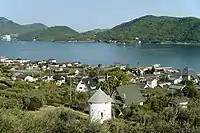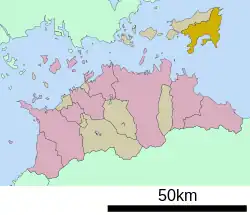Shōdoshima
小豆島町 | |
|---|---|
Town | |
   Clockwise from top: Bay looking south from Olive Park, soy sauce warehouse, Kankakei Gorge | |
 Flag  Seal | |
 Location of Shōdoshima in Kagawa Prefecture | |
 Shōdoshima Location in Japan | |
| Coordinates: 34°29′N 134°14′E / 34.483°N 134.233°E | |
| Country | Japan |
| Region | Shikoku |
| Prefecture | Kagawa Prefecture |
| District | Shōzu |
| Government | |
| • Mayor | Masahiko Oe |
| Area | |
| • Total | 95.59 km2 (36.91 sq mi) |
| Population (2020)[2] | |
| • Total | 13,646 |
| • Density | 140/km2 (370/sq mi) |
| Time zone | UTC+09:00 (JST) |
| City hall address | 2100-4 Ikeda, Shōdoshima-chō, Shōzu-gun, Kagawa-ken 761-4388 |
| Climate | Cfa |
| Website | www |
| Symbols | |
| Flower | Olive |
| Mascot | Olive Shimachan |
| Tree | Olive |
Shōdoshima (小豆島町, Shōdoshima-chō) is a town in Kagawa Prefecture, Japan, with a population of 13,646.[2] The town was established in 2006 and covers various ports and communities on the eastern half of Shōdoshima, the second-largest island in the Seto Inland Sea.[3] Shōdoshima is roughly halfway between the much larger islands of Shikoku to the south and Honshu to the north, and has a mild and relatively dry climate.
Soy sauce production, which flourished through the early 20th century, remains a major industry.[4] Other industries include sōmen noodles, tsukudani (made with soy sauce), fishing and agriculture.[5] In Japan, olives were first successfully cultivated here in the 1910s[6] and olive oil production resurged in the late 20th century.[7]
Tourism is also economically important.[5] Shodoshima participates in the Setouchi Triennale, a regional art festival,[8] and the mountainous interior is home to Kankakei Gorge. The book and film Twenty-Four Eyes was set on the island, and a movie studio park and museum attracts visitors.[5]
Geography
Climate
Shōdoshima has a humid subtropical climate (Köppen climate classification Cfa) with hot, humid summers, and cool winters. Some rain falls throughout the year, but the months from May to September have the heaviest rain. The average annual temperature in Shōdoshima is 16.0 °C (60.8 °F). The average annual rainfall is 1,161.3 mm (45.72 in) with July as the wettest month. The temperatures are highest on average in August, at around 27.4 °C (81.3 °F), and lowest in January, at around 5.6 °C (42.1 °F).[9] The highest temperature ever recorded in Shōdoshima was 38.4 °C (101.1 °F) on 21 August 2000; the coldest temperature ever recorded was −6.6 °C (20.1 °F) on 26 February 1981.[10]
| Climate data for Uchinomi, Shōdoshima (1991−2020 normals, extremes 1978−present) | |||||||||||||
|---|---|---|---|---|---|---|---|---|---|---|---|---|---|
| Month | Jan | Feb | Mar | Apr | May | Jun | Jul | Aug | Sep | Oct | Nov | Dec | Year |
| Record high °C (°F) | 19.4 (66.9) |
23.9 (75.0) |
24.9 (76.8) |
29.4 (84.9) |
30.9 (87.6) |
35.3 (95.5) |
37.5 (99.5) |
38.4 (101.1) |
37.8 (100.0) |
31.7 (89.1) |
26.4 (79.5) |
21.4 (70.5) |
38.4 (101.1) |
| Mean daily maximum °C (°F) | 9.6 (49.3) |
10.3 (50.5) |
13.6 (56.5) |
19.0 (66.2) |
23.6 (74.5) |
26.5 (79.7) |
30.5 (86.9) |
32.3 (90.1) |
28.5 (83.3) |
23.1 (73.6) |
17.5 (63.5) |
12.2 (54.0) |
20.6 (69.0) |
| Daily mean °C (°F) | 5.6 (42.1) |
5.9 (42.6) |
8.8 (47.8) |
13.9 (57.0) |
18.5 (65.3) |
22.1 (71.8) |
26.1 (79.0) |
27.4 (81.3) |
24.0 (75.2) |
18.6 (65.5) |
13.2 (55.8) |
8.1 (46.6) |
16.0 (60.8) |
| Mean daily minimum °C (°F) | 1.9 (35.4) |
1.9 (35.4) |
4.3 (39.7) |
9.2 (48.6) |
14.0 (57.2) |
18.5 (65.3) |
22.8 (73.0) |
24.0 (75.2) |
20.5 (68.9) |
14.8 (58.6) |
9.3 (48.7) |
4.4 (39.9) |
12.1 (53.8) |
| Record low °C (°F) | −4.7 (23.5) |
−6.6 (20.1) |
−4.7 (23.5) |
−0.6 (30.9) |
5.3 (41.5) |
10.8 (51.4) |
15.5 (59.9) |
16.6 (61.9) |
11.8 (53.2) |
4.9 (40.8) |
1.3 (34.3) |
−3.1 (26.4) |
−6.6 (20.1) |
| Average precipitation mm (inches) | 36.7 (1.44) |
43.2 (1.70) |
77.6 (3.06) |
78.4 (3.09) |
113.9 (4.48) |
156.7 (6.17) |
164.9 (6.49) |
116.7 (4.59) |
175.6 (6.91) |
118.6 (4.67) |
54.4 (2.14) |
42.9 (1.69) |
1,161.3 (45.72) |
| Average precipitation days (≥ 1.0 mm) | 5.6 | 6.9 | 9.4 | 9.2 | 8.9 | 10.6 | 9.5 | 6.4 | 8.6 | 7.7 | 6.3 | 5.9 | 95 |
| Mean monthly sunshine hours | 154.1 | 144.9 | 177.5 | 197.2 | 208.7 | 159.4 | 189.3 | 220.0 | 155.5 | 163.0 | 150.1 | 151.3 | 2,074.5 |
| Source: Japan Meteorological Agency[10][9] | |||||||||||||
Demographics
Per Japanese census data, the population of Shōdoshima in 2020 is 13,870 people.[11] Shōdoshima has been conducting censuses since 1920.
| Year | Pop. | ±% |
|---|---|---|
| 1920 | 23,363 | — |
| 1925 | 23,840 | +2.0% |
| 1930 | 25,496 | +6.9% |
| 1935 | 26,292 | +3.1% |
| 1940 | 24,820 | −5.6% |
| 1945 | 33,328 | +34.3% |
| 1950 | 32,144 | −3.6% |
| 1955 | 30,073 | −6.4% |
| 1960 | 27,567 | −8.3% |
| 1965 | 25,576 | −7.2% |
| 1970 | 23,448 | −8.3% |
| 1975 | 22,519 | −4.0% |
| 1980 | 22,170 | −1.5% |
| 1985 | 21,433 | −3.3% |
| 1990 | 20,455 | −4.6% |
| 1995 | 19,700 | −3.7% |
| 2000 | 18,303 | −7.1% |
| 2005 | 17,257 | −5.7% |
| 2010 | 16,153 | −6.4% |
| 2015 | 14,862 | −8.0% |
| 2020 | 13,870 | −6.7% |
| Shōdoshima population statistics[11] | ||
Notable locations
The town of Shōdoshima was created in 2006 by merging the former towns of Ikeda and Uchinomi, both from Shōzu District.[3] The total area is 95.59 km²,[1] and covers the entire eastern half of the island of Shōdoshima. Notable communities and locations include:
- Kankakei Gorge
- Sakate, a port in the southeast
- Kusakabe, a port and community, with soy sauce production concentrated to the east
- Olive Park/Olive Garden, olive orchards and tourist sites
- Twenty-Four Eyes Movie Studio, a tourist site for the book and film Twenty-Four Eyes
References
- 1 2 "Areas of Prefectures, Cities, etc. (in Japanese)". Geospatial Information Authority of Japan. January 1, 2021. p. 64. Retrieved 30 March 2021.
- 1 2 "Population Statistics, Kagawa Prefecture [in Japanese]". Kagawa Prefecture. September 1, 2021. Retrieved February 17, 2021.
- 1 2 "Outline of Shodoshima Town [in Japanese]". Shodoshima Town. Retrieved 1 April 2021.
- ↑ "History". Shodoshima Soy Sauce. Shodoshima Shoyu Association.
- 1 2 3 "導入促進基本計画 [Basic Industry Promotion Plan] (in Japanese)". Shodoshima Town. Retrieved 1 April 2021.
- ↑ "The Oldest Olive (in Japanese)". Olive Garden. Retrieved 1 April 2021.
- ↑ "Olives [in Japanese]". Shodoshima Town. Retrieved April 1, 2021.
- ↑ "Shodoshima". Art Setouchi. Retrieved 1 April 2021.
- 1 2 気象庁 / 平年値(年・月ごとの値). JMA. Retrieved April 24, 2022.
- 1 2 観測史上1~10位の値(年間を通じての値). JMA. Retrieved April 24, 2022.
- 1 2 Shōdoshima population statistics
External links
- Official website (in Japanese)